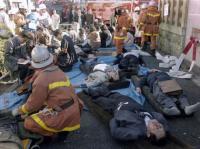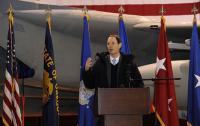-
Is Belgium’s nuclear security up to scratch?
Belgium’s counter-terrorism efforts are once again being called into question following the recent tragedies in Brussels. The attacks were carried out against soft targets – the public check-in area of Brussels Airport and Maelbeek metro station – but a series of unusual and suspicious occurrences were also reported at nuclear facilities in the country. These events highlight the very real threat to nuclear facilities. For Belgium, this recent episode is one item on a long list of security concerns. Based on this history, the Belgian authorities should be primed to take nuclear security especially seriously. But there are serious questions about whether they are.
-
-
Montenegro expels 58 members of Japanese doomsday cult Aum Shinrikyo

Montenegro has expelled fifty-eight foreigners, all members of the Japanese doomsday cult Aum Shinrikyo which, in March 1995, launched a deadly nerve gas attack on Tokyo’s underground. Twelve people were killed and thousands injured in Aum Shinrikyo’s nerve gas attack on a Tokyo commuters.
-
-
Sen. Wyden said he would filibuster efforts to mandate back doors

Senator Ron Wyden (D-Oregon), a critic of the NSA domestic spying programs, said he would filibuster any attempt by fellow lawmakers to require U.S. technology companies to weaken the encryption systems with which they equip their devices. Referring to Apple fight against a court order requiring the company to relax the encryption of iPhone used by the two San Bernardino terrorists, Wyden said that consumers were asking: “Are these for the privacy rights of the dead terrorist?”
-
-
French government abandons plan to strip terrorists of French citizenship
The French government has decided to abandon plans to strip convicted terrorists with dual nationality of their French citizenship and deport them.French president Francois Hollande also wanted to make the state of emergency, which gives the police special powers and which was imposed for three months after the November attacks, a permanent feature of the constitution, but the government was forced to abandon this proposal, too, in the face of stiff opposition.
-
-
Populist German party calling for banning construction, operation of mosques
A 45-page draft policy proposal, to be debated at the end of April at the annual conference of the AfD (Alternative für Deutschland),a populist, anti-immigration party which has been gaining in the polls, would prohibit the “construction and operation of mosques.” The policy draft, titled “Courage to take responsibility,” states that “Islam does not belong to Germany.” Mosques are conducive “not only to common prayer, but also to the spread of Islamic teachings directed towards the removal of our legal order,” the draft says.
-
-
American Airlines cancels all Brussels flights until 7 April
American Airlines announced it has canceled all flights to and from Brussels until 7 April. The carrier’s decision is in response to the 22 March suicide bombing attack at the Brussels airport. The explosion occurred near the American Airlines counter, and some of the thirty-two people killed in the blast were about to board an AA flight.
-
-
FBI cracks terrorists’ iPhone without Apple's help
The Justice Department on Monday asked a court to withdraw the government’s request that the court order Apple to help the FBI gain access to the encrypted iPhone used by the San Bernardino terrorists. The Justice Department filed the request after the FBI had successfully accessed data stored on an encrypted iPhone. The FBI wanted the court to compel Apple to relax the 10-attempt limit, which is part of the encryption system which comes with the device. If there are more than ten attempts to guess the password, the phone locks forever and all the data on it is wiped out. The FBI argued that its computers, using brute-force, would be able to break the phone’s password, but that it would take more than ten attempts.
-
-
ISIS “advanced plans” to attack Jewish children in Turkey thwarted

Isis has developed plans to carry out a terror attacks targeting Jewish children in Turkey, according to intelligence officials. Six operatives from the terror group, arrested in the Turkish city of Gaziantep last week, told Turkish investigators about an “imminent” attack against Jewish children. Istanbul’s synagogue in Beyoglu was one of the attacks. The synagogue operates a community center and a school.
-
-
Views of millions of Muslims “fundamentally incompatible with the modern world”: Tony Blair

Former British prime minister Tony Blair has said that “many millions” of Muslims hold a viewpoint which is “fundamentally incompatible with the modern world.” In comments he made over the weekend, Blair rejected arguments that ISIS is merely “tens of thousands of brainwashed crazies,” saying: “[ISIS] does not seek dialogue but dominance. It cannot therefore be contained. It has to be defeated.”
-
-
American Airlines cancels all Brussels flights until 7 April

American Airlines announced it has canceled all flights to and from Brussels until 7 April. The carrier’s decision is in response to the 22 March suicide bombing attack at the Brussels airport. The explosion occurred near the American Airlines counter, and some of the thirty-two people killed in the blast were about to board an AA flight.
-
-
Proposed bill would ban “burner” phones in the U.S.

Much of the recent debate revolved around terrorists using devices with end-to-end encryption. The terrorists who perpetrated the 13 November 2015 attacks in Paris used several encrypted phones – but three of them also used burner phones, concealing their communications by not having the owners’ names associated with the phones they used. Representative Jackie Speier (D-California) has proposed a bill which would ban burner phones in the United States.
-
-
Belgium has divided and decentralized itself almost out of existence

The 22 march Brussels bombings have called attention to the crisis of security across Europe in the face of terrorism and radicalization. But the incidents also add color to the image of Belgium as a failed nation-state, one that seems egregiously incapable of protecting its own people. As it is, Belgium is no longer a nation-state in any functional sense, but rather a “federation” of three different regions and of three different “linguistic communities.” As a result, it is host to an array of police and juridical districts that don’t map onto each other geographically, demographically, or politically. If Belgians don’t imagine a way to reinvent themselves as a functioning nation-state, despite their linguistic and other differences, the consequences could be dire indeed. Without a state strong enough to keep all its people safe, and cohesive enough to include all its divergent populations as citizens of a common polity, the forces behind what happened in Brussels on 22 March will only fester and grow.
-
-
Plum Island may be turned into a national park rather than sold to developers

Members of the New York and Connecticut congressional delegations announced on Friday a plan to launch a study of Plum Island’s natural and historic resources, saying the plan is one step toward halting the sale of the island to developers. In 2009 DHS said the island would be sold to developers to help fund the new BioLab Level 4 on the campus of Kansas State University, which is set to open in 2022.
-
-
Brussels attackers originally planned to attack a nuclear facility: Belgian authorities

The terrorists who attacked the airport and a metro station on Tuesday had originally considered targeting a Belgian nuclear site, but that such an attack would have required more time and planning. The terrorists abandoned the nuclear facility attack plan after Belgian security services arrested a number of Islamist militants, forcing the terrorists to act more quickly and focus on soft targets instead of a hardened nuclear facility. EU counterterrorism coordinator said that Belgium’s network of nuclear power stations could become the targets of cyberattacks by terrorists in the near future. “And if [ISIS] ever did turn to nuclear weapons,” one experts says, “they have more people, more money and more territory under their control and more ability to recruit experts globally than Al Qaeda at its best ever had.”
-
-
Turkey deliberately “unleashing” ISIS terrorists into Europe: King Abdullah
King Abdullah of Jordan asserted that Turkey is exporting ISIS-linked terrorists to Europe. The king made the remarks in a meeting with members of Congress, in which he said that Islamist militants were being “manufactured in Turkey” and “unleashed” into Europe. He also used the briefing with lawmakers, which was held after the king’s meeting with President Barack Obama was cancelled, to remind the American politicians of Turkey’s complicity in buying ISIS oil.
-
More headlines
The long view
What Does Netflix’s Drama “Adolescence” Tell Us About Incels and the Manosphere?
While Netflix’s psychological crime drama ‘Adolescence’ is a work of fiction, its themes offer insight into the very real and troubling rise of the incel and manosphere culture online.
A Shining Star in a Contentious Legacy: Could Marty Makary Be the Saving Grace of a Divisive Presidency?
While much of the Trump administration has sparked controversy, the FDA’s consumer-first reforms may be remembered as its brightest legacy. From AI-driven drug reviews to bans on artificial dyes, the FDA’s agenda resonates with the public in ways few Trump-era policies have.
The Center Can Hold — States’ Rights and Local Privilege in a Climate of Federal Overreach
As American institutions weather the storms of executive disruption, legal ambiguity, and polarized governance, we must reexamine what it means for “the center” to hold.
How to Reverse Nation’s Declining Birth Rate
Health experts urge policies that buoy families: lower living costs, affordable childcare, help for older parents who want more kids
Foundation for U.S. Breakthroughs Feels Shakier to Researchers
With each dollar of its grants, the National Institutes of Health —the world’s largest funder of biomedical research —generates, on average, $2.56 worth of economic activity across all 50 states. NIH grants also support more than 400,000 U.S. jobs, and have been a central force in establishing the country’s dominance in medical research. Waves of funding cuts and grant terminations under the second Trump administration are a threat to the U.S. status as driver of scientific progress, and to the nation’s economy.
The True Cost of Abandoning Science
“We now face a choice: to remain at the vanguard of scientific inquiry through sound investment, or to cede our leadership and watch others answer the big questions that have confounded humanity for millennia —and reap the rewards.”
